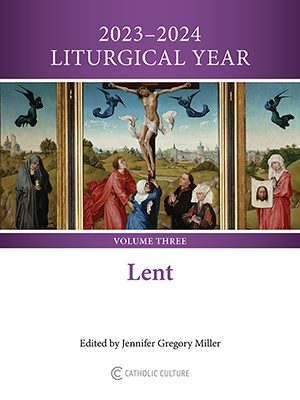The frightening power of God's love
By Phil Lawler ( bio - articles - email ) | Oct 15, 2008
On this feast of St. Teresa of Avila, I find myself thinking about the great mystics and their ability-- or should I say their willingness?-- to float away on the sea of God's love.
God's love is like an ocean, not only because it is immeasurably deep but also because it is infinitely powerful. And that power is more than a bit frightening.
During the summer many of us enjoy long playful days at the ocean. But we stay very close to the shoreline. Prudent vacationers respect the power of the sea. Not even the strongest swimmer can cope with a powerful current. If you stray too far from the shore, there's no telling where you'll end up. So we swim out just a few yards, carefully planning to put our feet down on solid ground again soon.
The spiritual life is like that, too. We want to experience God's love, but most of us aren't ready to abandon ourselves to that powerful force. We realize that if we throw ourselves completely into the stream of divine grace, we might lose control of our lives. We're frightened by that prospect. We want reassurances that we'll be able to go back whenever we want, and feel that familiar sand under our feet. So we are content to paddle in the shallow waters of grace. We want to be great saints, but not quite yet.
Then there are a few of us like St. Teresa, who bravely take the plunge. For years I was comforted by her statement that she really didn't know how to pray until she reached the age of 50. Then I passed that age, and now that statement isn't so comforting to me anymore.
Sooner or later each one of us will be carried away on the current, willingly or not. I've often thought that the great saints, who have fully abandoned themselves to God, must be spared some of the anguish of death. Not the physical pain; that's a medical matter. But the pain of letting go.
All comments are moderated. To lighten our editing burden, only current donors are allowed to Sound Off. If you are a current donor, log in to see the comment form; otherwise please support our work, and Sound Off!
-
Posted by: Pointmaster1386 -
Jan. 14, 2019 9:44 PM ET USA
To tell the truth about errors, failures and omissions to not hide the sins that occurred in the Church, must be done in a courageous way in order to draw the Light of Christ in Spirit and in Truth. Even if it is not spoken by the Person in charge, i.e., the Archbishop. The Church must keep salt in itself. The Church has not properly opposed this festering sins which has been lingering for a long time. I call upon heaven and Earth! It must come out, it must show itself like Adam & Eve from hidin
-
Posted by: feedback -
Jan. 04, 2019 12:37 PM ET USA
Excellent (and important) analysis. If there is any division among the American bishops, it would be between the majority who have had enough and do want to face the problems head-on with transparent honesty to end the scandals, and a tiny minority who would prefer to leave the ingrained networks of corrupt clergy intact and, more or less, continue the cover up. In this situation, Francis' call for a "unity" seems to mean "don't touch that rot." The February meeting will expose true intentions.
-
Posted by: bkmajer3729 -
Jan. 04, 2019 11:16 AM ET USA
Nothing has changed; more of the same. Sadly, I now recognize “the” problem goes straight to the top. I doubt there is anything we can say or write that will break this internal and errant culture among the Bishops.









